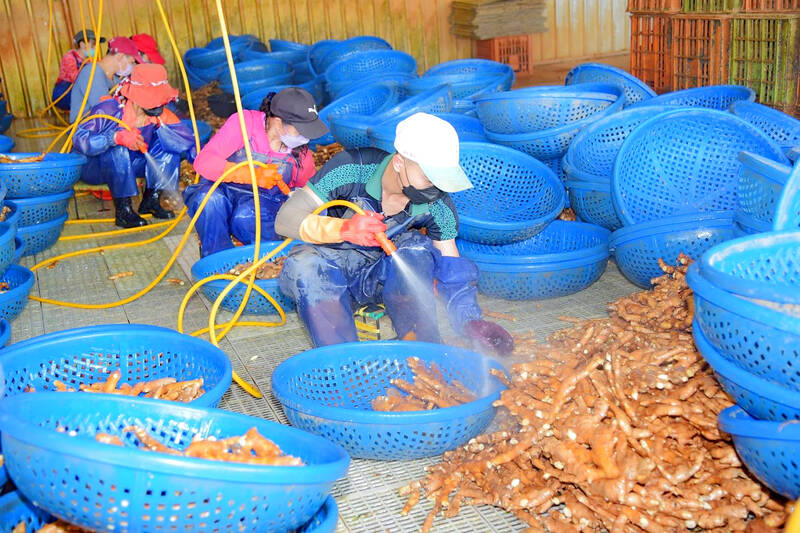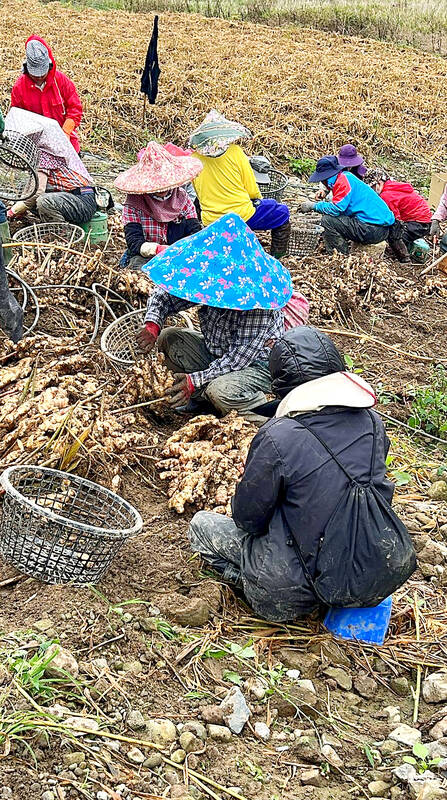In the media, the rhetorical counterpoint to the Taiwan construction-industrial state’s idea of development is the narrative of “overdevelopment,” which posits that humans have put too much of a good thing in places that cannot accept it as a result of development. In this narrative the rhetorical counterpoint to Han settlement is indigenous priority.
Ginger arrived in Taiwan during the Dutch period (1624-1668). The Dutch grew it as an export crop, along with cotton and sugarcane. Today, it is a cash crop grown in mountainous areas of Taiwan, particularly in Nantou (南投縣), Hualien (花蓮) and Taitung (臺東) counties, with around 1,000 hectares under cultivation, in total.
In Nantou County over 340 hectares of ginger is cultivated, largely in Mingjian (名間), Sinyi (信義) and Jhongliao (中寮) townships. In 2020 production boomed as ginger developed a reputation for efficacy against COVID-19, along with turmeric, another Mingjian product. This may have been luck, or clever promotion, reminiscent of the boom in pineapple demand during the SARS outbreak when, for a short period, it became a folk remedy against the disease.

Taipei Times file photo
IIn Taitung, 200-300 hectares of land is used for ginger cultivation, with Taimali (太麻里) and Beinan (卑南) townships the dominant production areas. When Typhoon Nepartak hit Taitung in 2016, it did immense damage to the local ginger crop.
In Miaoli (苗栗) around the famous Jiangma Yuan (薑麻園) — “jiangma” is Hakka for “ginger” — the Ginger Garden near Sanyi, the farmers rotate their fields, letting them lie fallow for five years before cultivating them for two years.
AGRICULTURAL CHALLENGES

Photo: Liu Pin-chuan, Taipei Times
The problem of ginger is that it is susceptible to diseases such as ginger soft rot (largely caused by Pythium myriotylum), transmitted via the soil where previous ginger crops have been planted. Ginger reproduces asexually, and farmers harvest rhizomes from previous seasons and retain them as disease-free mother rhizomes. Those are then chopped up to make seed rhizomes, which are planted. Hence, ginger cannot be cropped in the same field year after year. Worse, it means that land used for ginger often cannot be used for any other crop for several years.
Because of the disease issue, ginger farmers on the east coast constantly search for new land on which to grow ginger, which grows best in virgin soil. This drives conflicts between local indigenous peoples and Han farmers over land rights, and among the indigenous peoples themselves, who produce ginger and sell it in local and international markets, but whose internal land and social arrangements are still partly governed by the “gift economy” that underpins social relations, as well as ancient connections to the land.
Some of the conflicts are obvious and brutal. In 1963, Han farmers in the Dingyanwan (頂岩灣) area of Taitung were sent to prison for two weeks for illegally cultivating land in a government reserve forest area. In 1976, they refiled for the right to plant and the case dragged on for two more decades. Finally, in 2001, the Forestry Bureau decided to file charges against some 70 farmers for illegal planting, but local prosecutors declined to pursue the case. The Bureau then went ahead and charged the farmers with the rare crime of estrepement — willful destruction of land by a tenant.

Taipei Times file photo
In 2012, the local legislator brokered negotiations with the government that enabled the Han farmers to plant fruit trees.
The case’s illumination of Taiwan’s multiple unresolved post-colonial issues are highlighted by the 2014 filing by local Puyuma people, who argued that if the land was being opened for cultivation it should be returned to them. For them, the Han farmers are interlopers and land thieves, cultivating land that belongs to the Puyuma. Even when land is viewed as “indigenous land,” the government is still the entity defining the status of the land.
Ginger exacerbates these tensions because it requires virgin soil, meaning that it tempts local cultivators to cut down forests and plant ginger. Taiwan Plus reported on a case in which a local ginger farmer received permission to cut down trees for a local project, but went ahead and expanded the range of deforestation to prepare land for ginger. The land in question was indigenous land.
In narratives of mountain agriculture, “overdevelopment” often takes the blame for landslides, rather than the way it is carried out. A typical United Daily News (UDN) editorial shortly after Typhoon Morakot in 2009 observed of the disaster in which 500 people were buried by converging mudslides: “Xiaolin Village was a long-established Pingpu village, with mudslides a rare occurrence, which would seem to indicate that its original choice of location was a good one.”
The editorial noted that the villages destroyed by Typhoon Herb in 1996 were established by Han people who had settled along creeks to farm. When indigenous villagers cultivated land with their own backs and hand tools, the land was relatively unaffected. But development with backhoes and other machinery destroyed the balance indigenous peoples had maintained, UDN stated. This common but romantic view simplifies the indigenous people as innocent others, the opposite of the sophisticated but greedy Han.
THE EXOTIC OTHER
Like the indigenous people themselves, ginger is “othered” becoming an exotic good that sits at the junction of two healthy food ideologies, one the Chinese folk beliefs that characterize ginger as a “hot” food that offsets “coldness,” the other the modern faith that mountain foods grown in ostensibly clean environments are better, that wellness is directly related to closeness to nature. Taitung now promotes “organic” ginger, clean of all but the social tensions and environmental destruction it leaves in its wake.
Ginger cuts across all the easy binaries, the local and global, the settler and the colonized. It produces economic benefits for local farmers, both indigenous and Han. On the east coast indigenous land holders frequently rent their land to Han farmers, since indigenous people often lack the access to capital that would enable the large up-front investments required for cash crop farming. Yet, the short period of economically useful ginger production means that the land is often sloppily cultivated to save money, when it could be carefully tended and reconstructed to reduce the propensity for Taiwan’s steep slopes, among the most desiccated on earth, to produce landslides.
Instead, everyone in the local villages, Han or indigenous, can look up at the slopes that give them jobs, and wonder if and when a landslide will hit them.
Feels like karma? It’s the same compromise everyone working in Taiwan makes.
Notes from Central Taiwan is a column written by long-term resident Michael Turton, who provides incisive commentary informed by three decades of living in and writing about his adoptive country. The views expressed here are his own.

On April 26, The Lancet published a letter from two doctors at Taichung-based China Medical University Hospital (CMUH) warning that “Taiwan’s Health Care System is on the Brink of Collapse.” The authors said that “Years of policy inaction and mismanagement of resources have led to the National Health Insurance system operating under unsustainable conditions.” The pushback was immediate. Errors in the paper were quickly identified and publicized, to discredit the authors (the hospital apologized). CNA reported that CMUH said the letter described Taiwan in 2021 as having 62 nurses per 10,000 people, when the correct number was 78 nurses per 10,000

As we live longer, our risk of cognitive impairment is increasing. How can we delay the onset of symptoms? Do we have to give up every indulgence or can small changes make a difference? We asked neurologists for tips on how to keep our brains healthy for life. TAKE CARE OF YOUR HEALTH “All of the sensible things that apply to bodily health apply to brain health,” says Suzanne O’Sullivan, a consultant in neurology at the National Hospital for Neurology and Neurosurgery in London, and the author of The Age of Diagnosis. “When you’re 20, you can get away with absolute

May 5 to May 11 What started out as friction between Taiwanese students at Taichung First High School and a Japanese head cook escalated dramatically over the first two weeks of May 1927. It began on April 30 when the cook’s wife knew that lotus starch used in that night’s dinner had rat feces in it, but failed to inform staff until the meal was already prepared. The students believed that her silence was intentional, and filed a complaint. The school’s Japanese administrators sided with the cook’s family, dismissing the students as troublemakers and clamping down on their freedoms — with

As Donald Trump’s executive order in March led to the shuttering of Voice of America (VOA) — the global broadcaster whose roots date back to the fight against Nazi propaganda — he quickly attracted support from figures not used to aligning themselves with any US administration. Trump had ordered the US Agency for Global Media, the federal agency that funds VOA and other groups promoting independent journalism overseas, to be “eliminated to the maximum extent consistent with applicable law.” The decision suddenly halted programming in 49 languages to more than 425 million people. In Moscow, Margarita Simonyan, the hardline editor-in-chief of the